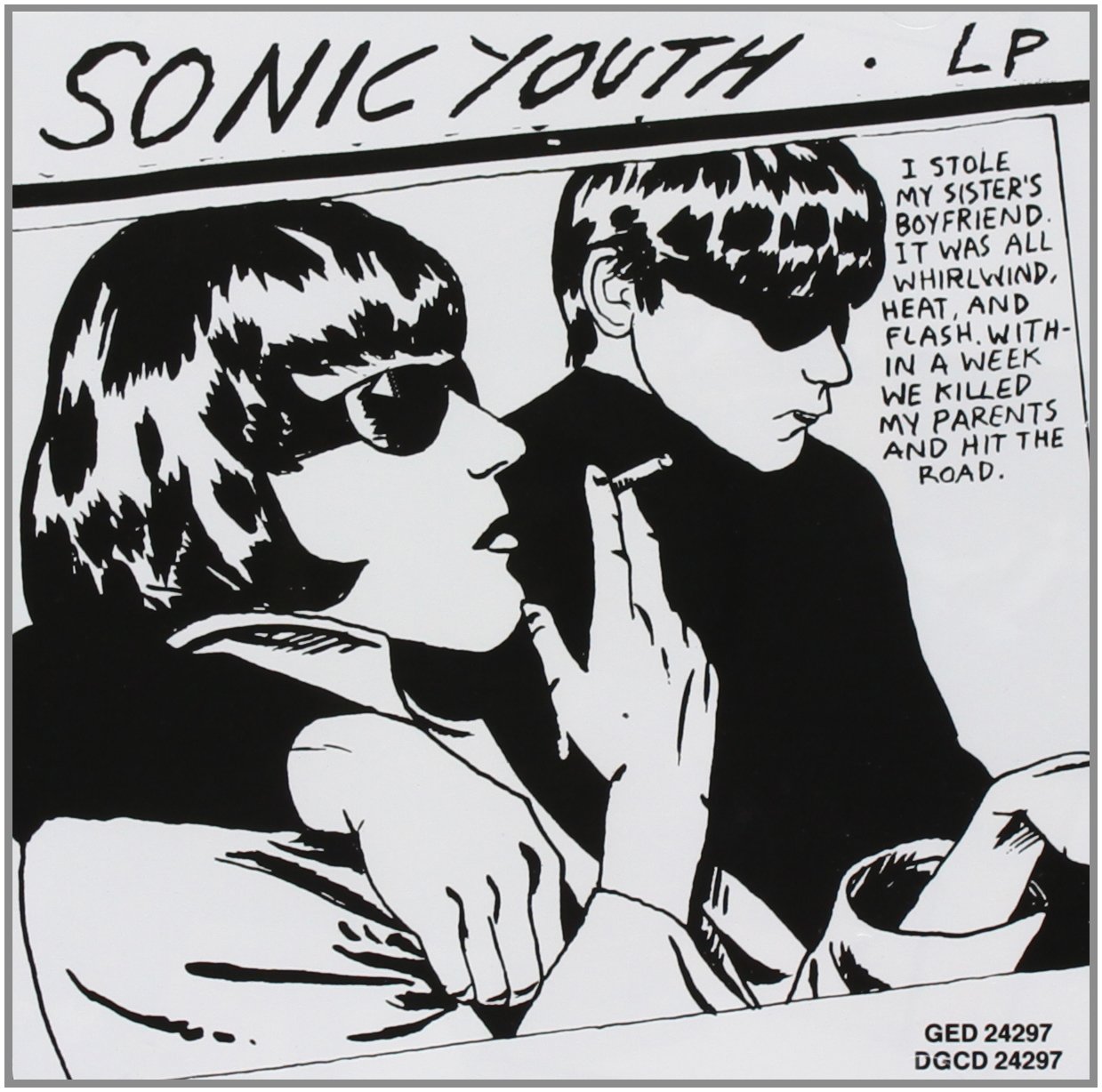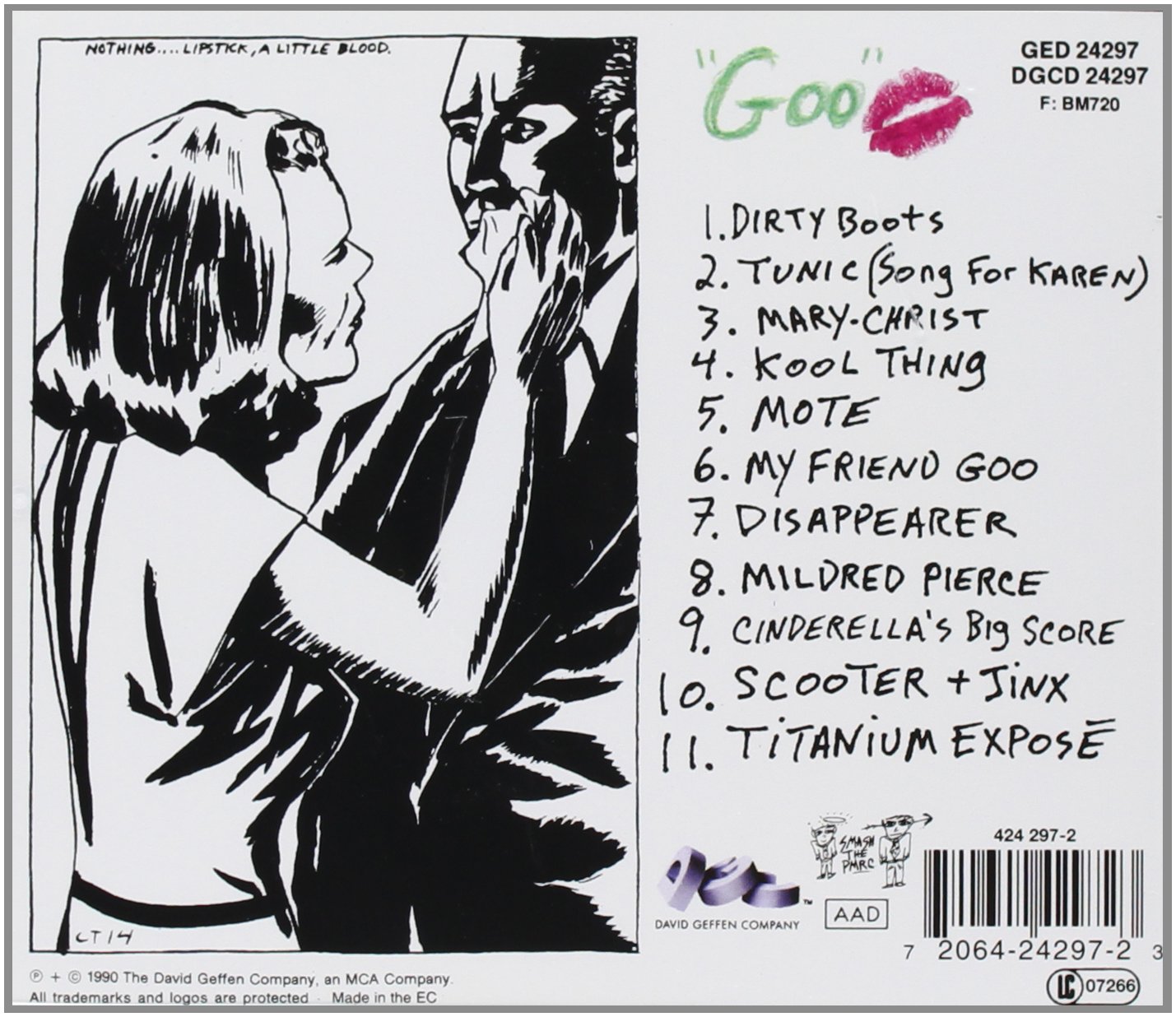Sonic Youth hit the majors to rock the road with the whirlwind, heat, and flash of this liberating titanium exposé. The critical acclaim afforded their previous album 'Daydream Nation' led to a deal with Geffen Records. Lee Renaldo recalls: "Daydream Nation was our last record on an independent label, Goo was the first record on a major, so it was a transition in a lot of ways. Daydream brought us to the top of the heap of the indie-college market and recognition by all of our peers; Daydream kind of capped off everything we set out to do when we started as a band, in terms of like wow, wouldn't it be great to make a record that a lot of people liked and listened to? We satisfied a lot of those goals by the time we did Evol, Sister, and Daydream and at that point the question is where do you go from there? Of course you want to keep making good records, but I think there were certain aspects to the indie rock situation at that point where we were pushing the envelope a little bit too far. We weren't happy with the distribution we were getting, and a few other things. So for a lot of ways it made sense for us to jump to a major label right then, and it made sense in terms of challenging ourselves to put ourselves in new situations. Obviously if we'd stayed in the world of independent releases we would have, for a time at least, been, like, at the very top of the heap there where we were with Daydream. Instead, you jump into this major-label environment and you're kind of on the bottom again and you have to scrap a little harder for your position, and I think that was a challenge we all were interested in...I see it more than anything else as a record that signified our transition from being on an indie to a major. One thing that people commented on when it came out was how much the music was like songs. Some people didn't expect that and some people said, 'oh, they're on a major now, they're writing songs.' And for me, I think of the group as one in which there's always this pendulum swinging back and forth between writing shorter, more concise pieces until we get kind of sick of it and then writing pieces that get more sprawling and experimental and explore in different directions. We were at the end of that mode when we were making Daydream, which had all these long, structurally sprawling pieces on it, so I think the pendulum was naturally swinging back towards making a record of songs. It happened to coincide with switching to a major label. I see it as a record where we were trying to create more discreet, individual songs...It was a chance to make a record that was all these discreet pieces that didn't flow together in that organic way that some of our previous work had...I think the thing that makes Goo more accessible that way is that the production values are much higher. That was the other thing we were certainly experimenting with, with that record is that we finally had a real serious recording budget, where we could go into the same kind of studio that any big band would be able to go into and work in. That was a bit of a difference because it sort of took us out of the ghetto of having to work really quickly in really dirt-cheap studios. It put us in the same bracket as anybody else. That was definitely interesting to have a serious budget."
'Goo' was recorded in New York City at Sorcerer Sound Recording Studios and Greene St. Recording and featured Thurston Moore on vocals, guitar, and production; Lee Ranaldo on guitar, vocals, and production; Kim Gordon on vocals, bass guitar, and production; and Steve Shelley on drums, percussion, and production; with J Mascis on backing vocals and additional production; Don Fleming on backing vocals, additional production, and additional percussion; and Chuck D providing additional vocals. Nick Sansano was involved in production, recording, additional engineering, and additional percussion; while Ron Saint Germain handled production, engineering, mixing. Dan Wood, John Herman, and Judy Kirschner were assistant engineers. Howie Weinberg did the mastering and Jim Waters did additional recording. The working title for the album was 'Blowjob?', which the band submitted to the executives at Geffen just to shake them up.
Shelley said at the time: "It was just something different to do. As opposed to repeating yourself time after time. We just wanted to write short songs that rocked. As compared to Daydream's long, drawn out songs kinda soft focused, ya know? It developed a really great mood, but in one way we wanted to change that for this album. Do something different basically...It doesn't feel that much different from what we've always done. Except for people are always asking us, like: 'How does it feel now that you're like big stars or now that you're on a major label?' And it doesn't feel like anything. It just feels like...it's like...ya know, there was yesterday, and here's today, and then there's tomorrow. They all just kinda go in a row; It's like there's no big change or anything. Ya know?"
'Goo' charted at number ninety-six in the US, seventy-one in the Netherlands, thirty-two in the UK, and twenty-two in New Zealand.
Moore muses: “The major companies have seen indie and alternative music which started about 12 years ago become proven successful through companies like SST and Rough Trade. And the A&R people in the majors are the same age as the people running the indie labels. They are all in their late 20s or early 30s, so their sense of history is quite different from what went before. But they also know you can’t just pick up really weird off-the-edge underground bands – there’s no reason to anyway. The only purpose for being on a major label is if you have a lot of sales and your indie can’t deal with the number of records you should be selling...They get the album we give them but they don’t own the music. We have total artistic control but we don’t exploit that by putting some nudes or something on the cover. I guess we could – but they wouldn’t distribute it, so what’s the point? ... They thought it looked like a bootleg and a bit of a bad move but we always wanted to use one of Ray Pettibon’s drawings because he’s one of our favourite artist. This was the right time to do it, now that we are corporate...That was another reason why we used the cover - Reagan’s return to another era which was supposedly so safe and sound. That picture is about the bad seed. It’s based on photography of teenagers who actually did kill their parents and hit the road. They are the other side of his supposedly safe era...In the future there may be more crossover between artists and politicians, even though most people who get involved in the arts are people like myself who aren’t particularly articulate. We have another form of communication...But punk and hardcore, as much press as it got, was not exploited the way hippies were. Hardcore was huge but if it had been exploited it could have been massive maximum rock’n’roll – and it was totally independent of corporations...It’s important people know that music is a free thing and not to be dictated by anyone.”
Gordon considers: "It was Raymond Pettibon who once said that Hippie and Punk were just opposite sides of the same coin...We may have gone to a major label, but when we went on tour with Neil Young, we learned pretty quickly that we weren’t part of the mainstream – his audiences hated us! And being on a major label didn’t change us. We pretty much continued to do what we wanted to, including a lot of experimental stuff. Geffen never really promoted us, but in return they never pressured us either, or told us we had to go back and edit a song to turn it into something commercial. It was only when we signed with Matador that I realized in some ways that 'These are our people,' and not the other guys...There’s such a thing as art that’s entertaining or that presents itself as entertainment – art that is kind of showbizzy. Entertainment lives in its own context, outside a museum, and it’s usually more about escapism, whereas I’ve always considered art to be more confrontational ... [For the song "Tunic (Song for Karen)"], I wanted to put Karen Carpenter [who died of anorexia] up in heaven playing drums and being happy. This whole thing about teenage girls cutting themselves and that being associated with anorexia and girls being conditioned to having such a big desire to please – I'm just curious, because of [my daughter] Coco, at what point do girls start getting their sense of self-worth and [need to please] people, and why don't they have anything else? ... I was trying to put myself into Karen’s body. It was like she had so little control over her life, like a teenager – they have so little control over what’s happening to them that one way they can get it is through what they eat or don’t. Also I think she lost her identity, it got smaller and smaller. And there have been times when I feel I’ve lost mine. When people come and ask me about being famous or whatever and I don’t feel that, it’s not me. But it makes me think about it. The music is definitely about the darker side. But I also wanted to liberate Karen into heaven."
http://www.sonicyouth.com/
'Goo'
full album:
http://open.spotify.com/album/5iYYQwB0oH9FVyVlaOXZdr
https://www.youtube.com/playlist?list=PL2F87EE8CE2792C06
https://www.youtube.com/playlist?list=PLJyyZ6-_YzwGdctumRmby1NOT-DAWWJHH
All music composed by Sonic Youth (Thurston Moore, Kim Gordon, Lee Ranaldo, Steve Shelley).
1. "Dirty Boots" 5:28
2. "Tunic (Song for Karen)" 6:22
3. "Mary-Christ" 3:11
4. "Kool Thing" 4:06
5. "Mote" 7:37
6. "My Friend Goo" 2:19
7. "Disappearer" 5:08
8. "Mildred Pierce" 2:13
9. "Cinderella's Big Score" 5:54
10. "Scooter + Jinx" 1:06
11. "Titanium Exposé" 6:27




No comments:
Post a Comment